Mass sperm whale deaths across Western Europe

[cs_section id=”” class=” ” style=”margin: 0px; padding: 45px 0px; ” visibility=”” parallax=”false”][cs_row id=”” class=” ” style=”margin: 0px auto; padding: 0px; ” visibility=”” inner_container=”true” marginless_columns=”false” bg_color=””][cs_column id=”” class=”” style=”padding: 0px; ” bg_color=”” fade=”false” fade_animation=”in” fade_animation_offset=”45px” fade_duration=”750″ type=”1/1″][cs_text id=”” class=”” style=”” text_align=””]26th February 2016
Since mid-January, 29 sperm whales have died on beaches in the Netherlands, France, Germany and Britain. They are believed to be members of the same pod, a group of young males migrating south from subpolar waters. Its unclear why these sperm whales entered these shallow waters, given that they are deep-sea mammals and can easily become disoriented if they get into shallow water. The shallow water makes it difficult for them to use their acoustic orientation to navigate and many become beached.
The sperm whale is the largest of the toothed whales, and the largest toothed predator. It can measure up to 67 feet (20 metres) long and weigh over 50 tonnes. All the whales in this pod were “bachelor” or juvenile males. Females and calves stay in warmer waters and the males leave as they become sexually active and form bachelor pods. They will then go back to the warmer areas on an annual basis to mate.
The possible reasons why these whales have become stranded include underwater noise from sea traffic, oil platforms, military sonar, and marine earthquakes which interfere with the whales acoustic signals. Other potential causes include a change in the distribution of the whale’s prey leading them into shallow waters and man-made climate change.
Once these animals are out of water they are consider by experts to already be dying. These whales weigh between 25 to 30 tonnes; this makes it very difficult to move these mammals or to put them out of their misery. Their bodies go through a process of breaking down and releasing toxins, causing organ failure.
[/cs_text][/cs_column][/cs_row][/cs_section][cs_section id=”” class=” ” style=”margin: 0px; padding: 45px 0px; ” visibility=”” parallax=”false”][cs_row id=”” class=” ” style=”margin: 0px auto; padding: 0px; ” visibility=”” inner_container=”true” marginless_columns=”false” bg_color=””][cs_column id=”” class=”” style=”padding: 0px; ” bg_color=”” fade=”false” fade_animation=”in” fade_animation_offset=”45px” fade_duration=”750″ type=”1/1″][x_slider animation=”slide” slide_time=”7000″ slide_speed=”1000″ slideshow=”false” random=”false” control_nav=”false” prev_next_nav=”true” no_container=”false” ][x_slide]![]() This sperm whales washed up on the Lincolnshire coastline on Sunday. Photograph: Dan Kitwood/Getty Images[/x_slide][x_slide]
This sperm whales washed up on the Lincolnshire coastline on Sunday. Photograph: Dan Kitwood/Getty Images[/x_slide][x_slide]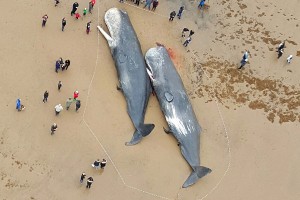 Beached whales at Skegness on January 24[/x_slide][x_slide]
Beached whales at Skegness on January 24[/x_slide][x_slide]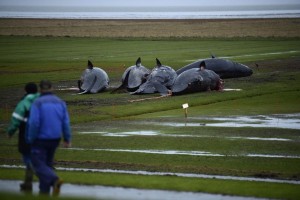 Five of the total of first eight sperm whales that washed up dead on the mud flats near Dithmarschen, Germany. Alexander Koerner / Getty Images[/x_slide][x_slide]
Five of the total of first eight sperm whales that washed up dead on the mud flats near Dithmarschen, Germany. Alexander Koerner / Getty Images[/x_slide][x_slide]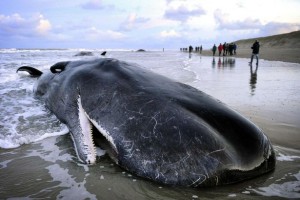 Loss: People walk near a beached sperm whale on the Dutch island of Texel[/x_slide][x_slide]
Loss: People walk near a beached sperm whale on the Dutch island of Texel[/x_slide][x_slide]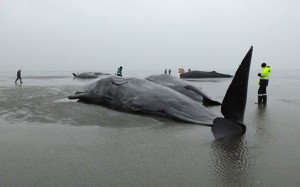 The eight whales found near the northern town of Friedrichskoog Photo: EPA[/x_slide][x_slide]
The eight whales found near the northern town of Friedrichskoog Photo: EPA[/x_slide][x_slide]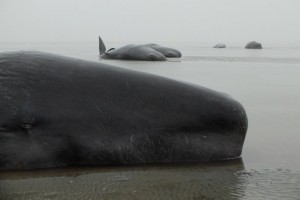 Ten sperm whales have washed up on the German shore. Brunckhorst / LKN.SH / AFP / Getty Images[/x_slide][/x_slider][/cs_column][/cs_row][/cs_section]
Ten sperm whales have washed up on the German shore. Brunckhorst / LKN.SH / AFP / Getty Images[/x_slide][/x_slider][/cs_column][/cs_row][/cs_section]







